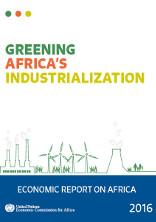Economic report on Africa 2016: greening Africa’s industrialization
 Africa experienced strong economic growth in the last decade, and its medium-term growth prospects remain positive, despite global economic headwinds. However, this growth has not yet translated into commensurate benefits in economic diversification, decent jobs and rapid social development. The continent has defined a vision and associated agenda for its attainment by 2063, signalling the importance of structural transformation in public and policy discourse. Realizing the 2063 vision aligns well with broader global development targets, as reflected in the Sustainable Development Goals, the Addis Ababa Action Agenda on Financing for Development and other internationally agreed development agendas, especially the 2015 Climate Change Agreement. Several countries are now formulating their national visions and development strategies to deliver green growth, climate resilience and long-term de-carbonization of their economies. African countries have the chance of being front-runners in this field—if they move quickly. This 2016 edition of the Economic Report on Africa presents the case for sustainable and people-centred green industrialization in Africa. Given the impacts of climate change, resource scarcities and environmental degradation, measures for greening Africa’s development are critical and can bring significant benefits. The form and pattern of Africa’s industrialization, shaped by its abundant natural resources, especially water and renewable energy sources, are discussed in the report, alongside the reshaping of policy to tackle poverty and inequality. The report explores the role of de-coupling energy and economic activity and the greening of value chains as a route to generate low-carbon growth in Africa. Country case studies demonstrate ongoing greening activities across key sectors. And a modeling of alternative scenarios—under “business as usual” and “greening”—make the case for the continent to achieve its strategic goals of structural transformation and industrialization, in ways that are sustainable and inclusive.
Africa experienced strong economic growth in the last decade, and its medium-term growth prospects remain positive, despite global economic headwinds. However, this growth has not yet translated into commensurate benefits in economic diversification, decent jobs and rapid social development. The continent has defined a vision and associated agenda for its attainment by 2063, signalling the importance of structural transformation in public and policy discourse. Realizing the 2063 vision aligns well with broader global development targets, as reflected in the Sustainable Development Goals, the Addis Ababa Action Agenda on Financing for Development and other internationally agreed development agendas, especially the 2015 Climate Change Agreement. Several countries are now formulating their national visions and development strategies to deliver green growth, climate resilience and long-term de-carbonization of their economies. African countries have the chance of being front-runners in this field—if they move quickly. This 2016 edition of the Economic Report on Africa presents the case for sustainable and people-centred green industrialization in Africa. Given the impacts of climate change, resource scarcities and environmental degradation, measures for greening Africa’s development are critical and can bring significant benefits. The form and pattern of Africa’s industrialization, shaped by its abundant natural resources, especially water and renewable energy sources, are discussed in the report, alongside the reshaping of policy to tackle poverty and inequality. The report explores the role of de-coupling energy and economic activity and the greening of value chains as a route to generate low-carbon growth in Africa. Country case studies demonstrate ongoing greening activities across key sectors. And a modeling of alternative scenarios—under “business as usual” and “greening”—make the case for the continent to achieve its strategic goals of structural transformation and industrialization, in ways that are sustainable and inclusive.
